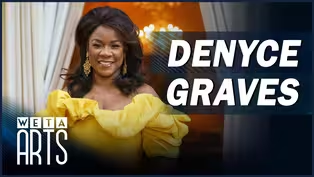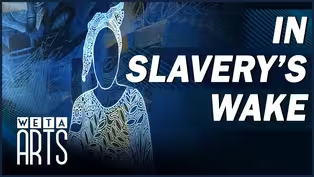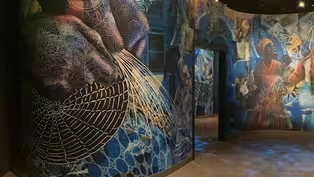
Meet the Man on a Journey to Perfect Frédéric Chopin's Music
Clip: Season 12 Episode 5 | 9m 42sVideo has Closed Captions
Pianist Brian Ganz reflects on his lifelong connection to Frédéric Chopin.
As part of the "Extreme Chopin" series at the Music Center at Strathmore, pianist Brian Ganz is on a journey to perform Frédéric Chopin's complete works—sharing the beauty, mystery, and emotional depth of the composer’s music. In this interview with WETA Arts host Felicia Curry, Ganz reflects on his lifelong connection to Chopin.
Problems playing video? | Closed Captioning Feedback
Problems playing video? | Closed Captioning Feedback
WETA Arts is a local public television program presented by WETA

Meet the Man on a Journey to Perfect Frédéric Chopin's Music
Clip: Season 12 Episode 5 | 9m 42sVideo has Closed Captions
As part of the "Extreme Chopin" series at the Music Center at Strathmore, pianist Brian Ganz is on a journey to perform Frédéric Chopin's complete works—sharing the beauty, mystery, and emotional depth of the composer’s music. In this interview with WETA Arts host Felicia Curry, Ganz reflects on his lifelong connection to Chopin.
Problems playing video? | Closed Captioning Feedback
How to Watch WETA Arts
WETA Arts is available to stream on pbs.org and the free PBS App, available on iPhone, Apple TV, Android TV, Android smartphones, Amazon Fire TV, Amazon Fire Tablet, Roku, Samsung Smart TV, and Vizio.
Providing Support for PBS.org
Learn Moreabout PBS online sponsorshipSince 2011, the Music Center at Strathmore has been hosting a series called Extreme Chopin.
Chopin is considered one of the most important composers in history.
His music has inspired musicians worldwide, including Maryland-based pianist Brian Ganz, who is featured in the Extreme Chopin project.
♪ Ganz, voice-over: Chopin is, for me, the greatest storyteller in the history of music.
♪ He knew how to take this language of music and tell vivid stories that are emotionally-- sometimes gut-busting.
♪ I remember falling in love with the "First Ballade in G minor" and doubling over and thinking, "How can music be so beautiful that it hurts?"
Now we're going to hear it in one of the most gorgeous, emotional explosions of joy you will ever hear in a piece of music.
♪ I sometimes say Chopin wounded me and that wound shaped my life.
♪ There is no therapy better than playing that passage.
[Chuckles] ♪ My intention after falling in love with Frederic Chopin's music was always to play his complete works.
♪ There is nothing by Chopin that I don't want to play.
♪ One of the aspects of Chopin's music that absolutely captivated me is Chopin's evocation of mystery.
♪ The piece ends, but it does not resolve.
And that, for our ears, is pure mystery.
And this is what I love most about his music and what I'm so eager to share about his music.
Curry, voice-over: Ganz started studying piano at age 9.
Ganz, voice-over: My grandfather was my first inspiration.
He could sit down and just tell a story with the piano, and I knew that I wanted to do that someday.
Curry, voice-over: His teachers inspired him to immerse himself in music, and his performance career began.
Ganz, voice-over: I couldn't leave school officially until I turned 16.
But at age 15, I was already traveling around the country to play concerts and I was playing with orchestras and I was playing solo recitals.
Curry, voice-over: Ganz eventually dropped out of high school and fully devoted himself to music.
Ganz, voice-over: I was practicing 6, 7, 8 hours a day.
I wanted to be the best pianist in the world.
I was 17 the first time I played at the Kennedy Center, and Arthur Fiedler was conducting the program with the National Symphony.
I played the Prokofiev Third Piano Concerto.
It was a phenomenal privilege and thrill, but it was not an entirely positive experience.
There was a certain amount of unhealthy perfectionism.
The slightest mistake would embarrass me.
And I thought, "No.
I've got to step back."
I had to find answers.
Curry, voice-over: He found answers in a spiritual book called "A Course in Miracles."
Ganz, voice-over: I fell passionately in love with that book the way I fell in love with Chopin, and it became my spiritual bread and butter daily.
And I spent hours and hours reading it and meditating, and it saved my life.
It made it clear it's not about me.
It doesn't matter if I'm the greatest pianist in the world.
It doesn't even matter if I'm the best pianist I can be.
What matters is that I contribute to the beauty in the world, that I have something to share, and that I share it with love and with eagerness and with passion.
And the more I immersed myself in that, the more I felt ready to return to solo playing... ♪ until finally, I can remember-- I was listening...to one of the great Chopin etudes and thinking, "How can I live with not playing this?
I can't.
I cannot live with not playing this piece."
I went back.
I was 25 years old.
This was 1985, and my first concert back, all Chopin.
I couldn't get enough.
[Chuckles] Curry, voice-over: Ganz went on to perform internationally.
Ganz, voice-over: Just after I went back to solo playing, there was an opening at St. Mary's College of Maryland.
And I didn't know whether they would be interested in somebody who hadn't even graduated from high school.
And they said, you know, "Well, that's not great, but come on down and audition for us."
So, I went down and I played the G minor Ballade.
They hired me as the piano teacher there, and I found my home.
♪ Better.
That was the best one.
♪ So--this is an excellent candidate for juxtaposition.
We have... ♪ De da ♪ and then... ♪ Deee daaa!
♪ Can the second one have a little more power?
-Yeah.
-Try it one more time.
♪ Ganz, voice-over: I could never live without teaching.
I can be teaching a piece I've played dozens of times, but when I'm teaching it, I will see something that I did not see when I was just playing it myself.
♪ Good, good, good.
That was gorgeous.
The deep listening is taking effect.
Performing, teaching.
I'll never stop either one, voluntarily, at least... [Chuckles] till the day I die.
Here's our first waltz of the piece.
It's a slow, mournful waltz.
Curry, voice-over: And in this lecture at St. Mary's, he dissects the First G minor Ballade.
This, by the way, is where I doubled over in pain as a 12-year-old-boy.
[Chuckles] ♪ What was it that was so beautiful about that?
I think it was the dissonance resolution.
Dissonance resolution.
♪ New chord.
♪ And then that intensifies and things get more dramatic.
♪ [Applause] Thank you.
Thank you.
Woman, voice-over: He plays like nobody else, and he explains his music that goes to your soul, to your head, to-- to all of you.
He's just magnificent as--not only as an artist but as a person.
Ganz, voice-over: This is about contributing to the beauty in the world, inspiring others, about sharing my love, my joy, my freedom as best I can.
That has been the journey of being a musician for me.
Curry, voice-over: In partnership with the National Philharmonic, Brian Ganz performs the 14th installment of the Extreme Chopin series on February 28th.
Go to strathmore.org for details.
♪
Denyce Graves: From DC Roots to Opera Icon
Video has Closed Captions
Clip: S12 Ep5 | 9m 7s | Felicia Curry sits down with Denyce Graves to discuss her life and career. (9m 7s)
"In Slavery’s Wake" is a Groundbreaking New Exhibit at the Smithsonian NMAAHC
Video has Closed Captions
Clip: S12 Ep5 | 8m 4s | Explore "In Slavery’s Wake: Making Black Freedom in the World," a new exhibit at NMAAHC. (8m 4s)
Preview: WETA Arts February 2025
Preview: S12 Ep5 | 30s | Nat. Museum African American History & Culture; singer Denyce Graves; pianist Brian Ganz (30s)
Providing Support for PBS.org
Learn Moreabout PBS online sponsorshipSupport for PBS provided by:
WETA Arts is a local public television program presented by WETA


















